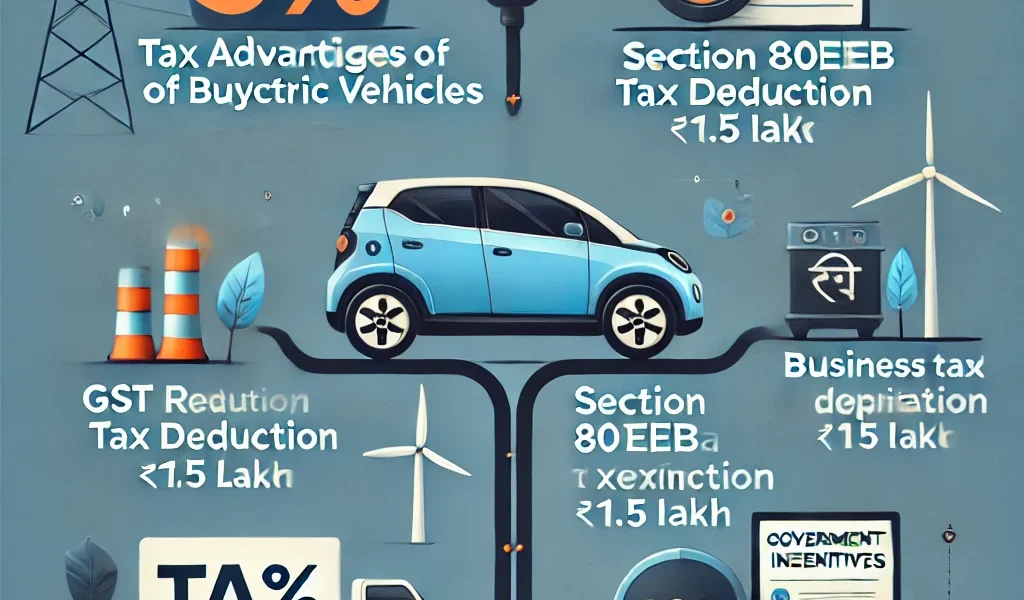As electric vehicles (EVs) gain popularity in India, many consumers are considering their financial and environmental benefits. One of the biggest advantages of purchasing an electric vehicle is the potential tax savings. The Indian government provides various incentives and tax benefits to encourage EV adoption, making them an attractive investment for both individuals and businesses. This guide explores the tax advantages of buying electric vehicles and how you can maximize your savings.
1. Understanding the Government’s Push for EVs
The Indian government aims to reduce carbon emissions and promote green energy through its Faster Adoption and Manufacturing of Electric Vehicles (FAME) scheme and tax incentives. These incentives help reduce the upfront cost of EVs, making them more affordable.
Key Government Policies Supporting EVs
- FAME II Scheme: Provides subsidies for electric two-wheelers, three-wheelers, and four-wheelers.
- State-Level Incentives: Various state governments offer additional benefits, including road tax exemptions and registration fee waivers.
- Income Tax Benefits: Tax deductions are available under the Income Tax Act to encourage EV adoption.
2. Tax Benefits on Buying an Electric Vehicle
a) Section 80EEB: Income Tax Deduction on EV Loan Interest
- Under Section 80EEB of the Income Tax Act, individuals can claim a deduction of up to ₹1.5 lakh per financial year on interest paid for loans taken to purchase an EV.
- This benefit is available only to individuals, not businesses or firms.
- The loan must be taken from a financial institution or non-banking financial company (NBFC).
- The deduction is applicable for both two-wheeler and four-wheeler electric vehicles.
b) Lower GST Rate on EVs
- The Goods and Services Tax (GST) on electric vehicles has been reduced from 28% to 5%, significantly lowering the purchase price.
- In comparison, petrol and diesel vehicles attract GST rates between 18% and 28%, making EVs more tax-efficient.
c) Road Tax and Registration Fee Exemptions
- Many state governments offer road tax exemptions on electric vehicles, which further reduces the cost of ownership.
- Some states, such as Delhi, Maharashtra, and Tamil Nadu, have completely waived the registration fee for EVs.
3. Business Tax Benefits for Electric Vehicles
a) Depreciation Benefits for Companies
- Businesses purchasing electric vehicles for commercial use can claim higher depreciation benefits.
- The Income Tax Act allows a 40% depreciation rate on electric vehicles used for business purposes.
- This helps businesses reduce their taxable income and overall tax liability.
b) Input Tax Credit (ITC) on GST
- Businesses registered under GST can claim input tax credit (ITC) on GST paid for purchasing electric vehicles if they are used for commercial purposes.
- This means that GST paid on EVs can be offset against the company’s GST liability.
4. EV-Specific Incentives Offered by States
State-wise EV Benefits
Different states in India offer additional incentives to promote electric vehicle adoption. Some notable benefits include:
- Delhi: Up to ₹1.5 lakh subsidy on electric cars; road tax and registration fee exemption.
- Maharashtra: ₹2.5 lakh subsidy on electric cars; scrappage incentive for old vehicles.
- Karnataka: Road tax exemption and benefits for fleet operators using EVs.
- Tamil Nadu: Subsidies for charging stations and commercial electric vehicle operators.
5. Savings Calculation: EV vs. Petrol/Diesel Vehicle
| Tax Component | Electric Vehicle (EV) | Petrol/Diesel Vehicle |
|---|---|---|
| GST | 5% | 18-28% |
| Road Tax | Exempted/Reduced | 8-12% of vehicle cost |
| Registration Fee | Exempted in some states | Applicable |
| Income Tax Deduction (Section 80EEB) | Up to ₹1.5 lakh | Not applicable |
| Depreciation Benefit (For Businesses) | 40% | 15% |
Overall, EV owners enjoy lower taxes, registration fees, and operating costs compared to traditional petrol/diesel vehicles.
6. Additional Financial Benefits of EV Ownership
- Lower Fuel Costs: Electricity is significantly cheaper than petrol and diesel.
- Reduced Maintenance Expenses: EVs have fewer moving parts, reducing servicing costs.
- Long-Term Resale Value: As demand for EVs grows, their resale value is expected to increase.
7. Steps to Maximize EV Tax Benefits
- Finance Your EV with a Loan: To claim a deduction under Section 80EEB, purchase your EV using a bank or NBFC loan.
- Choose an EV-Friendly State: Check for state-specific subsidies, tax waivers, and incentives before purchasing.
- Use for Business Purposes: If you are a business owner, purchase an EV in your company’s name to claim depreciation benefits and ITC on GST.
- Register Early: Some state incentives are available on a first-come, first-served basis, so register your EV as soon as possible.
8. Future of EV Tax Benefits in India
The Indian government is likely to introduce further incentives to promote EV adoption, such as:
- Additional income tax deductions for EV buyers.
- Expansion of the FAME subsidy scheme to more vehicle categories.
- Incentives for installing home charging stations.
Conclusion
Purchasing an electric vehicle in India comes with multiple tax benefits, including deductions under Section 80EEB, lower GST rates, road tax exemptions, and business depreciation benefits. These financial advantages, combined with lower running and maintenance costs, make EVs an excellent choice for cost-conscious buyers. By taking advantage of available government incentives and planning your EV purchase wisely, you can maximize your tax savings and contribute to a cleaner environment.
With continued government support and technological advancements, EVs are set to become the future of sustainable transportation in India. Now is the perfect time to make the switch and reap the financial and environmental benefits of electric mobility!




